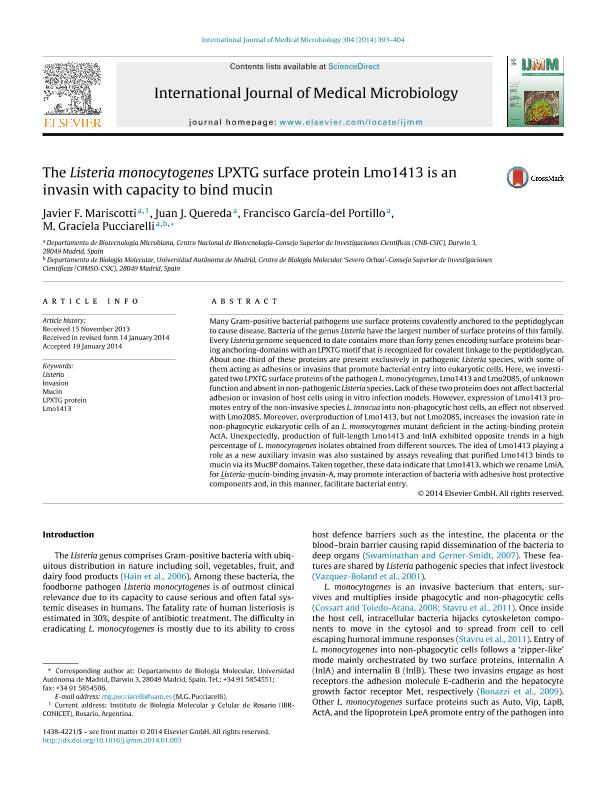Artículo
The Listeria monocytogenes LPXTG surface protein Lmo1413 is an invasin with capacity to bind mucin
Mariscotti, Javier Fernando ; Quereda, Juan J.; García del Portillo, Francisco; Pucciarelli, M. Graciela
; Quereda, Juan J.; García del Portillo, Francisco; Pucciarelli, M. Graciela
 ; Quereda, Juan J.; García del Portillo, Francisco; Pucciarelli, M. Graciela
; Quereda, Juan J.; García del Portillo, Francisco; Pucciarelli, M. Graciela
Fecha de publicación:
02/2014
Editorial:
Elsevier Gmbh
Revista:
International Journal of Medical Microbiology (print)
ISSN:
1438-4221
Idioma:
Inglés
Tipo de recurso:
Artículo publicado
Clasificación temática:
Resumen
Many Gram-positive bacterial pathogens use surface proteins covalently anchored to the peptidoglycan to cause disease. Bacteria of the genus Listeria have the largest number of surface proteins of this family. Every Listeria genome sequenced to date contains more than forty genes encoding surface proteins bearing anchoring-domains with an LPXTG motif that is recognized for covalent linkage to the peptidoglycan. About one-third of these proteins are present exclusively in pathogenic Listeria species, with some of them acting as adhesins or invasins that promote bacterial entry into eukaryotic cells. Here, we investigated two LPXTG surface proteins of the pathogen L. monocytogenes, Lmo1413 and Lmo2085, of unknown function and absent in non-pathogenic Listeria species. Lack of these two proteins does not affect bacterial adhesion or invasion of host cells using in vitro infection models. However, expression of Lmo1413 promotes entry of the non-invasive species L. innocua into non-phagocytic host cells, an effect not observed with Lmo2085. Moreover, overproduction of Lmo1413, but not Lmo2085, increases the invasion rate in non-phagocytic eukaryotic cells of an L. monocytogenes mutant deficient in the acting-binding protein ActA. Unexpectedly, production of full-length Lmo1413 and InlA exhibited opposite trends in a high percentage of L. monocytogenes isolates obtained from different sources. The idea of Lmo1413 playing a role as a new auxiliary invasin was also sustained by assays revealing that purified Lmo1413 binds to mucin via its MucBP domains. Taken together, these data indicate that Lmo1413, which we rename LmiA, for Listeria mucin-binding invasin-A, may promote interaction of bacteria with adhesive host protective components and, in this manner, facilitate bacterial entry.
Palabras clave:
INVASION
,
LISTERIA
,
LMO1413
,
LPXTG PROTEIN
,
MUCIN
Archivos asociados
Licencia
Identificadores
Colecciones
Articulos(IBR)
Articulos de INST.DE BIOLOGIA MOLECULAR Y CELULAR DE ROSARIO
Articulos de INST.DE BIOLOGIA MOLECULAR Y CELULAR DE ROSARIO
Citación
Mariscotti, Javier Fernando; Quereda, Juan J.; García del Portillo, Francisco; Pucciarelli, M. Graciela; The Listeria monocytogenes LPXTG surface protein Lmo1413 is an invasin with capacity to bind mucin; Elsevier Gmbh; International Journal of Medical Microbiology (print); 304; 3-4; 2-2014; 393-404
Compartir
Altmétricas



